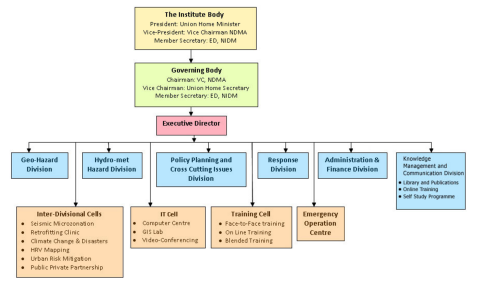Theme 1: Ecological Data & Data Center Infrastructures
Written by: Tony Cho
Research conducted by: Seowoo Nam, Dohee Jeon, Jiyun Lee, Tony Cho
Written by: Tony Cho
Research conducted by: Seowoo Nam, Dohee Jeon, Jiyun Lee, Tony Cho
Written by: Tony Cho
Research conducted by: Eunbin Cho, Yuwan Kim, Heewon Kim, Tony Cho

Slow Futures Laboratory presents the Slow Seoul Workshop.
The Disaster Management Act of 2005 constitutes the responsibilites of the NIDM to be human resource development, capacity building, training, research, documentation and policy advocacy in the field of disaster management. The organization aims to promote disaster management as a high priority in the national goverment. They also aspire to create "a culture of prevention" pertaining to disasters that involves all stakeholders.
The Minister of Home Affairs acts as the President, and the Vice Chairman of the NDMA (National Disaster Management Authority) acts as Vice President. The body of the organiation is comprised of 42 members including secretaries of nodal Ministries and Departments of Government of India and State Governments, the heads of national scientific, research and technical organizations, and eminent scientists and practioners. The governing body of the organization, which runs its day to day operations, is comprised of 16 members, and is chaired by the Vice Chairman of the NDMA, with the Secretary of Home Affairs acting as the Vice President.

"So far, however, the idea of setting up a trust fund to allow the Haitian government to eradicate cholera by providing clean water and sanitation has been a deal-killer among international donors."
"'If we do get a final order that the UN's immunity doesn't apply, we would expect the UN to put in clean water and sanitation and compensate the victims,' Concannon says [....] That's the optimistic view."
"That kind of political morass is one big reason - though by no means the only one - why the billions in relief and recovery aid haven't been enough to rescue Haiti from the disasters that fate kept flinging its way."
The Disaster Management Act of 2005 constitutes the responsibilites of the NIDM to be human resource development, capacity building, training, research, documentation and policy advocacy in the field of disaster management. The organization aims to promote disaster management as a high priority in the national goverment. They also aspire to create "a culture of prevention" pertaining to disasters that involves all stakeholders.